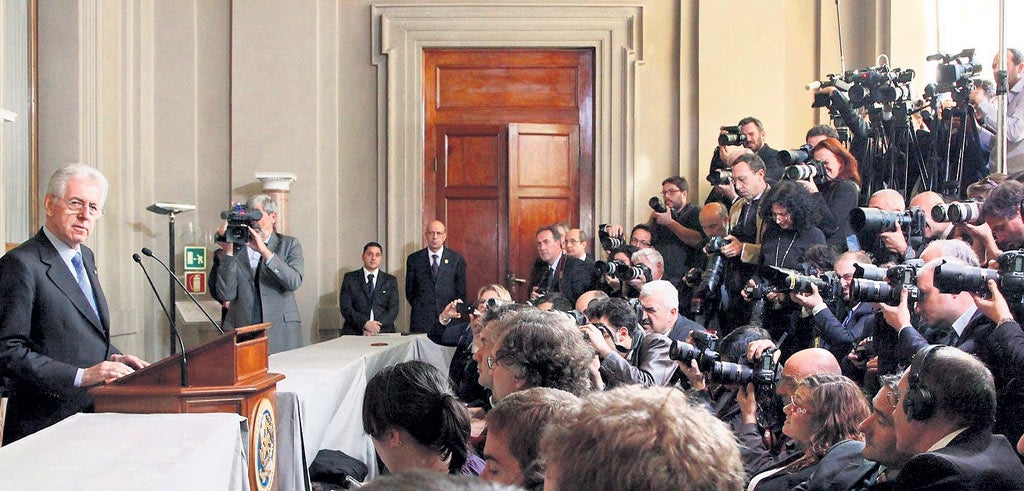Matio Monti gets to work with a cabinet of the unelected

Your support helps us to tell the story
From reproductive rights to climate change to Big Tech, The Independent is on the ground when the story is developing. Whether it's investigating the financials of Elon Musk's pro-Trump PAC or producing our latest documentary, 'The A Word', which shines a light on the American women fighting for reproductive rights, we know how important it is to parse out the facts from the messaging.
At such a critical moment in US history, we need reporters on the ground. Your donation allows us to keep sending journalists to speak to both sides of the story.
The Independent is trusted by Americans across the entire political spectrum. And unlike many other quality news outlets, we choose not to lock Americans out of our reporting and analysis with paywalls. We believe quality journalism should be available to everyone, paid for by those who can afford it.
Your support makes all the difference.Italy will embark on a controversial 18-month gamble today to improve its finances and rescue the euro by handing control to an administration of unelected technocrats with strong links to Brussels and international finance.
The country's parliament is expected to vote in the government of Mario Monti, a former EU competition commissioner, together with his cabinet which, it was revealed yesterday, contains not a single elected politician.
After being asked to form a government by President Giorgio Napolitano, following the collapse of Silvio Berlusconi's discredited centre-right administration, it was believed Mr Monti, a 68-year-old economist, might recruit some established politicians as ministers. However, when asked yesterday why his cabinet contained no parliamentary figures, Mr Monti said his talks with party leaders suggested "the non-presence of politicians in the government would help it".
"This government with ties to banks, to business, to the Vatican, to private universities – to the usual names – is the opposite of what this country needs," said Paolo Ferrero, leader of the far-left Rifondazione Comunista party. But Roberto D'Alimonte, political science professor at Rome's LUISS University, approved the cabinet, whose members he described as "high-calibre, highly respected and independent".
Much of the Italian public appeared to accept that exceptional measures were necessary, and the mainstream political parties tacitly admitted they would not be able to carry the required reforms through parliament. A poll conducted by IPR Marketing showed that 53 per cent of Italians back the new administration.
In Greece, a new coalition government easily won a confidence vote in parliament, backing a pledge by the Prime Minister, Lucas Papademos, to speed up long-term reforms and secure a massive new bailout deal involving banks and rescue creditors.
Meanwhile, the European Central Bank stepped up purchases of Italian bonds in an effort to calm investors. But the markets remained unconvinced and yields on 10-year government bonds edged back above 7 per cent yesterday, suggesting growing concerns that the Monti government would default on its debt repayments.
Concerns over the degree of EU influence on Italy's internal affairs may have been heightened by remarks from the German Chancellor, Angela Merkel, who said she hoped Mr Monti would "implement Italy's pledges to tackle its debt and restore market confidence". Many pundits, though, felt that a Monti-led administration offered Italy its best chance of doing just that.
"We need an Italy that's for economic growth, that's against corruption and the mafia, and reintroduces meritocracy," said Franco Panvoncello, a professor of politics at John Cabot University in Rome.
"A lot of what Monti plans to introduce will hurt. But [his government] will combine the cuts with things like a wealth tax to make Italy a fairer place."
Meet the new bosses: Key figures in Mario Monti's government
Mario Monti
The new PM will also take on the pivotal economics and finance portfolio. A distinguished free-market economist, adviser to Goldman Sachs and former European Competition Commissioner, Mr Monti is also president of Milan's Bocconi university.
Giulio Terzi di Sant'Agata
Mr Terzi di Sant'Agata, the new Foreign Minister, has been Italy's ambassador to Washington since October 2009. The 65-year old is an experienced diplomat with a low public profile and no clear political leanings, who began his career in the foreign ministry.
Anna Maria Cancellieri
The new Interior Minister has a reputation for championing women's issues. Ms Cancellieri ran Bologna as special administrator in 2010, after the City's mayor quit in a corruption scandal. She subsquently and resisted pressure to run for mayor
Corrado Passera
The head of Italy's second biggest bank Intesa Sanpaolo, Mr Passera, 56, is the new Industry and Infrastructure Minister. He is said to have centre-left political leanings and was rumoured to have been considered for a cabinet position in Romano Prodi's 2006 government.
To do: Monti's tasks
Francesco Giavazzi, professor of economics at Bocconi University where Mario Monti is president, says the new Italian leader faces five key challenges:
l. Reform the labour laws that currently provide only for miserable short-term contracts or jobs for life, but little in between
2. Reintroduce property tax, which was abolished by the former prime minister, Silvio Berlusconi
3. Speed the torturously slow legal system; with trials taking an average of six years, many businesses go under while awaiting disputed payments
4. Abolish the undeserved privileges of Italy's politicians – national or local – "or else the country might explode". Do regional representatives really deserve a pension for life after serving only one term in office? Do 72,000 public officials really need to have chauffeurs?
5. Start selling off state assets to make inroads in the debt mountain, and more importantly, boost long-term productivity.
Subscribe to Independent Premium to bookmark this article
Want to bookmark your favourite articles and stories to read or reference later? Start your Independent Premium subscription today.
Join our commenting forum
Join thought-provoking conversations, follow other Independent readers and see their replies
Comments